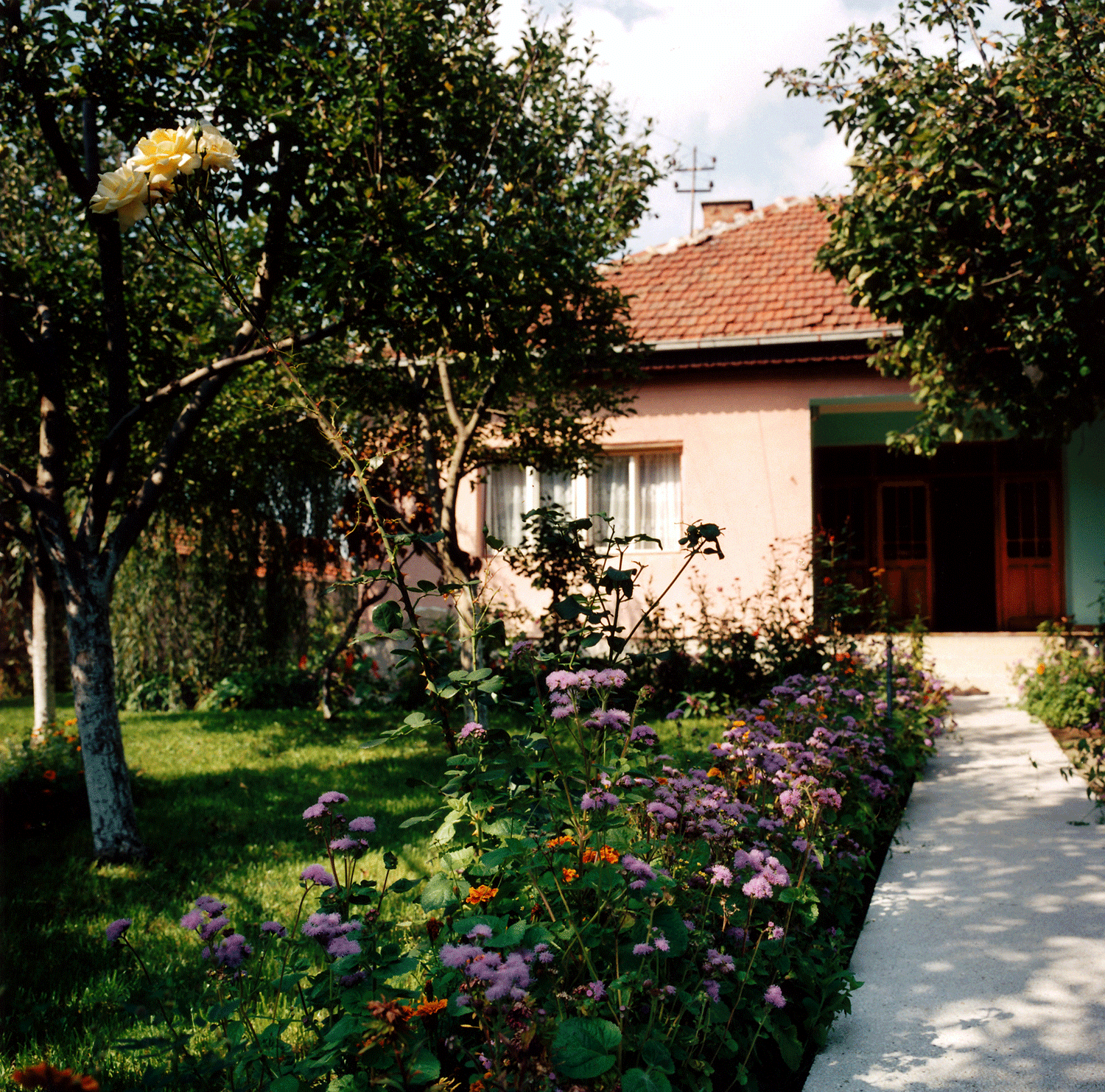
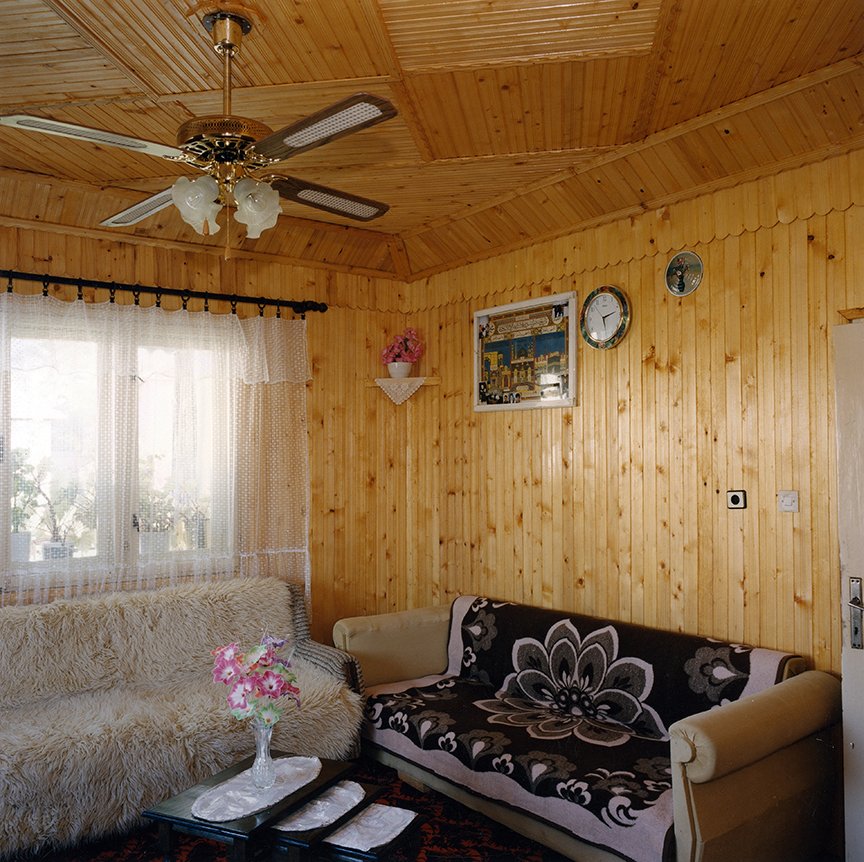

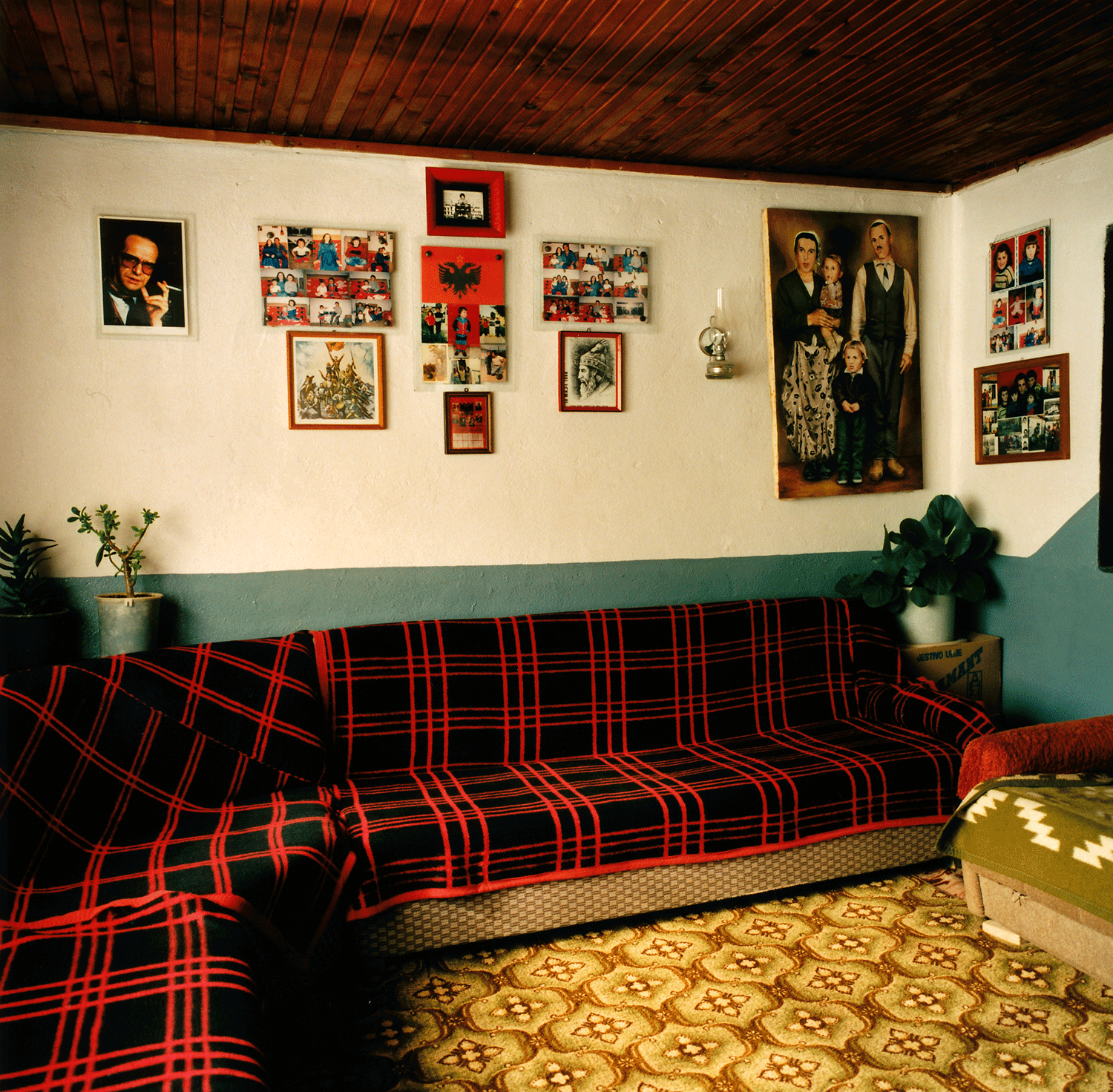
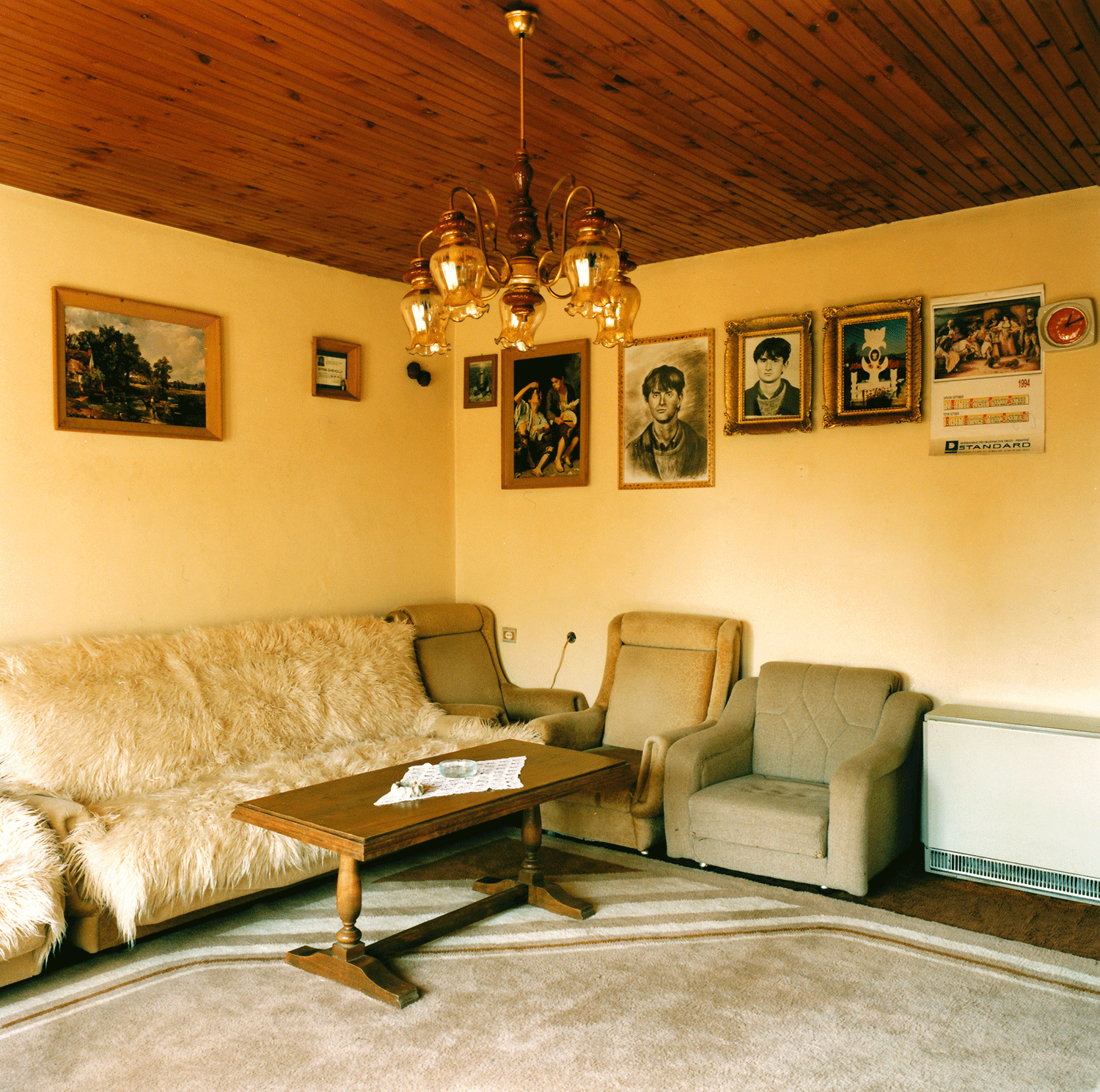


![“My father was shouting back “Kosova Republic,” “Never die Kosova,” “Never die Albania”… I suddenly saw him fall. He said “[My daughter] get out. The bullets got me” … When the police found out that he was dead, they started singing Serbian national](https://images.squarespace-cdn.com/content/v1/5bbdbe2df8135a43ec94f9a2/1545156948556-S33NYKFA6FJ1DX44DHB7/3.gif)
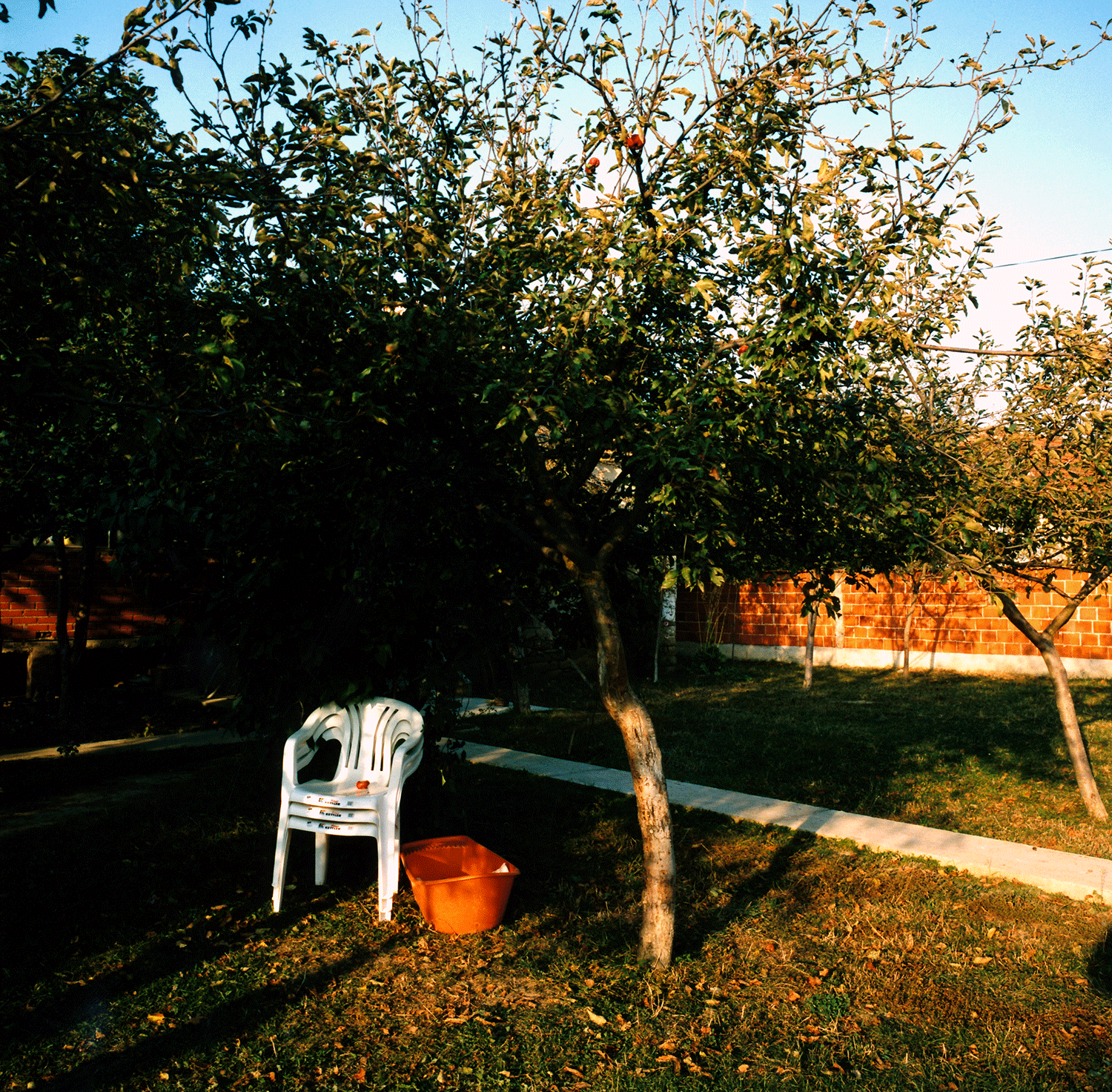
Note: Selected images above. Images can be viewed without text but excerpts from interviews with inhabitants appear as the mouse hovers over the image. (The gallery did not have text by the images on the wall in addition to the soundtrack; but the catalogue had texts opposite the images).
All photographs © Melanie Friend/Homes & Gardens: Documenting the Invisible, 1996. Texts © Melanie Friend and all contributors 1996.
Extract from the introductory text panel in the 1996 exhibition
In the summer of 1993, I interviewed an elderly Kosovar man who had been beaten up by Serbian police on the floor of his living room. His son had been brutally assaulted and pinned against the wall of the house by police threatening him with machine guns. A reproduction of The Hay Wain(1821) by the English landscape painter John Constable hung on the wall; sun streamed through the window onto sheepskin rugs. As I left this house in rural Kosovo with its trimmed garden lawn and colourful flower beds, its deckchair on the veranda, I was powerfully reminded of English lawns and village gardens back home in my parents’ village in southern England. When I returned to that village in 1994, the old man was dead. He had never recovered from the beating he had received, around the head, and in the back, with guns.
The photographs in this exhibition were mostly taken in villages, far from Kosovo’s capital Pristina. In the mid 1990s, under the regime of Serbian ruler Slobodan Milosevic, villages and small towns seemed to be the main focus of the state police raids targeting the ethnic Albanian majority population. It was more difficult for both local and foreign photojournalists to reach these villages from Pristina; frequent police checkpoints and surveillance meant it was almost impossible to witness a raid in action, or its immediate aftermath. Police often cordoned off the whole village for several weeks. Unless the photographer, by chance, was on the scene quickly, there remained no visual evidence of the raid; weeks later the bruises would have faded, unlikely to transfer effectively into a newspaper photograph; or those beaten up had often fled their homes.
Note: This work was made in 1994-95, in the climate of fear that pervaded Kosovo at the time. It grew out of the difficulties of documenting visual evidence of human rights abuses in what was effectively a police state. Moving away from a photojournalistic approach, I decided to work with the tension between the beauty and quiet ordinariness of the homes and gardens I visited – where the violence had taken place – and the horror of the stories I heard.
Exhibition tour/reviews Homes and Gardens: Documenting the Invisible was first shown at Camerawork Gallery, London, in 1996 and then toured, including shows at the University of Bradford Gallery II, and the Houston Center for Photography, USA (1998). Later on, it was included in the international group show Claustrophobia at the Ikon Gallery, Birmingham which from 1998 to 2000 toured the UK/Denmark. In 2001 Homes and Gardens was newly curated, and shown together with my sound/image installation piece The Guide in a joint exhibition with Roger Ballen at the Hasselblad Center, Sweden (curator: Val Williams). An edited, digital version of Homes and Gardens: Documenting the Invisible was included in a multi-touch installation to accompany the exhibition of work by artist Frans Masereel If you Wish for Peace (30 April – 14 August 2022) at the Musée National de la Résistance et des Droits Humain at Esch-sur-Alzette, Luxembourg.
The exhibition has been widely reviewed, for example in the art/photography journals Spot (Houston Center for Photography, USA), Katalog (UK/Denmark) Creative Camera (UK), Mute digital arts journal (UK), and Art and The Home (Academy Editions, UK), The Independent (UK) – to view these, please see Reviews section on this website (top menu). Part of the work was reproduced in Home Cultures (Berg, Vol.4, issue 1, March 2007); two US academics, Professor Wendy Kozol of Oberlin College, and Professor Wendy Hesford have written extensively about the work.
The soundtrack The exhibition used a soundtrack of voiced testimonies, mostly in Albanian, juxtaposed with images of innocuous, peaceful, ordered domestic interiors and gardens where violent abuse by police or security forces had taken place. The soundtrack was heard on speakers in the gallery and not linked to any particular image. The visitor was offered a transcript (with a translation of the Albanian voiced extracts) to take around the gallery - see below. Interviewees were kept anonymous owing to the danger of being identified. The original exhibition comprised a 14-minute soundtrack, and 16 small (30cm x 30cm) framed images. In the catalogue, extracts from the interviews were published opposite the images.
© Melanie Friend
Audio Transcript Duration: 14 minutes
Sound of rooks in Pristina, Kosovo's capital, fades into:
Woman, 37 (in Albanian):
"Early one morning at five minutes to six someone knocked at the door*, we saw a policeman trying to get in ... I went out and told Rashit to run away because the police have arrived. I opened the door and thirty policemen came in ... then five of them surrounded me, one of them hit me whereas the others were asking about my husband and were waiting to hit me with their machine guns. They kept asking: 'Where is your husband?' and I said that he went to his friends last night and hasn't come back yet. 'He was here, we saw him', they said. I said, 'no'. They got into a room, saw two made up beds and asked who slept there. 'My children,' I replied. As my children got frightened, they went to another room, there were five in one bed and one in another one. They were all sweaty from fear, and didn't move at all for two hours. They searched everywhere looking for Rashit and then left. Immediately I made the beds thinking that they have really gone. I got my little two year old daughter and changed her nappies, when suddenly they came back and three of them came in. They said to me: 'Tell us where your husband is, he's here, we've just seen him' and I kept saying ‘no’. They started searching all over again and were swearing and shouting at me and searching everywhere.
They started searching all over again and verbally abused me ... my children were watching and feeling frightened. Then one of them said that he will take them out of bed and start searching. I said that they can do that as there was nothing to be found ..."
*Note: Sometimes 'door' refers to the outer door to the compound, rather than the house itself. There may often be extended families living in one 'compound', but in two or more separate houses.
School student, 18 (in English):
"... the police stopped us and asked us for ID. My friend actually he didn't have the ID with himself, he forgot it at home, they took him to the police station and the next thing I knew is that he was in the hospital the day after that. He was really tortured, I don't know how did they do that, but then he was telling me that, he was telling me that he was beaten by the police, and the only thing that he knew it was when they hit him last in the (back of the head), and he didn't know anything after that what happened, because I think that he was unconscious, that's all."
Woman, 37 (in Albanian, cont'd):
"...But then they said that I have hidden machine guns under their bedclothes and under the pillows. I asked them why aren't they doing it [searching] then, and they replied because the children were asleep. And then they immediately changed their minds by saying that they were pretending to be asleep. I said maybe they are, so what, they are listening to what you are doing. They are only small kids, never done anything, and you come here to search and frighten them ...
... In Kosova we all suffer from them. I had been hoping for better but this seems to be endless. Every day we hear of terrible new happenings ... My husband has already been away from home for three months now, as it's dangerous for him to stay here. The children miss him a lot and ask: 'Where is he? When is he coming back?' Sometimes he comes in for five minutes during the day and leaves quickly.
Every minute we are frightened that they may come back, and every time the bell rings the kids get frightened and ask me to open the door. Any time this happens they jump and say 'Mum, it's the police, come to take daddy away ..."
(the following year her husband left Kosovo)
School student, 18 (in English, cont'd):
"I was stopped from the police a lot of times but it's very hard I have fear and they stop you they ask for ID, and if you don't have it they will torture you maybe they will take you to the police station, and God knows what they do with you then and your parents maybe won't know, and they won't call your parents and when you go home maybe you will be tortured and maybe you will have to go to the hospital or doctor because they have tortured you too much, it's like that ..."
Farmer, 47 (in Albanian):
"...They met me outside in the field, I had shorts and some old shoes on... straight away one of them grabbed me from my neck and the other one kicked me, so I fell. About six to seven policemen kicked me continuously. They stopped when they thought it was enough, and got me in the garden. There, another ten to fifteen of them started to beat me up. They hit me with anything they could. While this was happening I could hear the noises of breaking in the house. When they finished I was taken out by the wall. One of them was pointing a machine gun at me while the other one took a packet of cigarettes from my pocket. Another one got out some bullets and said that he would put them in my mouth instead of cigarettes ...."
School student, 17, (in English):
"This is the third year that I am coming here to learn and this is very bad way that we are learning here, so many times here have been coming policemen with two, maybe three, cars. They are interrupting us from where we are learning and we are really so afraid about that, every time our professors come in the class and they are saying just be quiet, don't say anything and don't be afraid, they'll go after a few minutes and something, we're all shaking, we're all afraid about that ..."
Farmer, 47 (in Albanian, cont'd):
"... After half an hour they left. When I got in the house, everything was broken and my 67 year old father was beaten up almost to death. He was hit in the head with a truncheon and in the back with guns. The sugar bag that was in the hall was torn and the sugar was all over the place. My father died less than a year after this. He was very disturbed after what happened and never recovered... how long this is going to continue, we don't know ..."
School student, 17 (in English, cont'd):
" ...We are learning in private houses and we are very in bad conditions, it's very cold here but we are trying to finish our school, our opportunity for learning, we don't have where to write, we have to take our notebooks in our hands and we're trying to write it somehow; we don't have a lot of books we can't keep them in our hands like normal children, we had to hide them when we are coming at school or something, because the police don't let us to come normal at school, they're stopping us and they're looking for our notebooks and all like that..."
Daughter, 17 (in Albanian):
"I offered help to my father to get the guns ready. While we were doing that, the police broke down our door. My father got out immediately with an axe in his hand to protect me. While protecting me he tried to hit the police with it, but the police hit him in his chest instead. At that moment the police fired. My father got the gun and fired back... at that time the police started to shout: 'Hasan come out. We know you are in; hand over the guns'. My father didn't surrender and tried to protect the house. 'The independence of Kosova needs victims', he said.
The police started throwing tear gas bombs. While the bombs were getting in the house, we wanted to get them and throw them out, but as the house got very smoky it was difficult to find them. While they were waiting for my father to surrender, they got my older brother and beat him up. They wanted to use him as a tool to make my father surrender. My father didn't surrender even then. The police kept shouting 'Better surrender, otherwise we will roast you like a pig and use your skin to make pockets' .."
School student, 18 (in English, cont'd):
"... anywhere we see them we are afraid and... we, we come to school because we know that the school is the most important thing, and we have to study and not be assimilated..."
Daughter, 17 (in Albanian, cont'd):
"... My father was shouting back: 'Kosova Republic', 'Never die Kosova', 'Never die Albania" ... At that moment the police started to beat up the children. After a while they were holding the children in front of them, so my father couldn't fire. Only my father and myself were left inside. Then he started to talk to me and said: 'If the bullet hits me from the back then you may cry for me, because I'll feel that I have handed over Kosova to Serbia. If the bullets hit me from the front, in my chest, then I don't want any of you to cry for me.". The police shouted: 'Don't you feel sorry for your life, you are surrounded by 300 policemen.' 'I am not feeling sorry for my life', he replied.
...Shortly after this my father got shot. I suddenly saw him fall. He said: 'My daughter, get out. The bullets got me ...' When the police found out that he was dead, they started singing Serbian nationalistic songs and congratulating each other ..."
Student, 17 (in English, cont'd):
" ... I don't know but I hope this will soon all be gone."
Farmer, 47 (in Albanian, cont'd):
"... My opinion is that the West hasn't been helpful at all. Lots of words but no action. These killings, thefts, beatings, have been going on for years, but no one did anything about it. We hoped that someone would help us, but we got only words from them ..."
Wild track:
Sounds in mountain village near Albanian border, where an Albanian who had been organising illegal schools had been shot dead. Farmyard sounds outside an illegal school, which has often been visited by police.
Rooks in Pristina
© Melanie Friend and all contributors 1996.